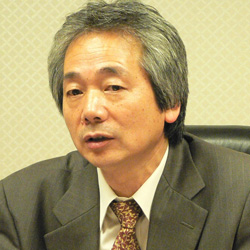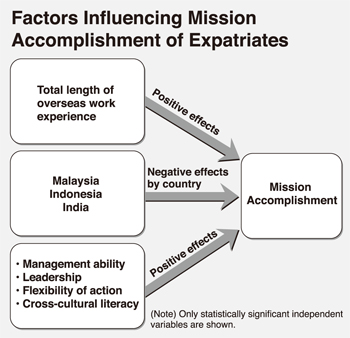|
Aug. 29, 2011
Why 'global human resources' are urgently needed in japan
MITSUHIDE SHIRAKI
Special to The Japan Times

Mitsuhide Shiraki
What are global human resources?
While Japanese investment in the domestic market is sluggish, Japanese investment into emerging markets has been increasing since 2000. Accordingly, "global human resources" - defined as human resources with a global perspective, a global network and the ability to operate globally - are indispensable in order to actually realize the basic premise of securing a competitive advantage. In the last several years, Japanese companies really began to recruit foreigners who graduated from Japanese universities, and both Japanese who were studying abroad in developed countries and local students from those countries as headquarters staff in Japan. This was in addition to the Japanese who graduated from Japanese universities.
Global human resources include those who can make decisions in a timely and appropriate manner from the global perspectives, according to their positions or functions at the headquarters; their successors; and the "expatriates" who are sent from the global headquarters to overseas subsidiaries to implement the head office's control and coordination. Intrinsically, no particular nationality is required of expatriates: any human resource that personifies the parent company's management principles and/or knowhow is sufficient. However, the reality is that most expatriates from Japanese multinational corporations are Japanese.
The number of Japanese expatriates is currently estimated at about 230,000, according to the Annual Report of Statistics on Japanese Nationals Overseas from the Ministry of Foreign Affairs. The number jumped from about 160,000 in 2000. By examining the overseas activities of Japanese global human resources, we can understand, relatively and objectively, the real status of Japanese global human resources, and then we can clarify what kinds of factors will be needed for global human resources in the future.
Thus, we should look at expatriates from perspectives such as their aptitude, individual mission accomplishment rate, relationships with local subordinates and colleagues. Through this, an attempt will be made to look forward into the issues of the future of Japanese global human resource development.
Japanese expatriates
The following four elements stipulate the expatriate's mission:
Expatriate's position at the locale;
Stage of growth of the local subsidiary (length of years in operation will be used as a proxy indicator);
Capital composition;
Local subsidiary's strategic positioning.
For the parent company, on the other hand, the mission completion rate of each expatriate it sends out is likely a concern of high importance. However, it is difficult to objectively determine this. As such, in our study, in order to make subjective self-evaluation of mission accomplishment more objective and multifaceted to some extent, six questions with a five-point scale evaluation were prepared regarding expatriates' job performance as compared to others, such as their predecessors or other local managers of equivalent status. In so doing, we tried to provide a more objective supplement to each individual's mission completion self-appraisal. The average factor points for these questions were utilized as the "Mission Accomplishment Rate." These were used as dependent variables for the regression analysis.
(This is a part of the research undertaken for the 2008 and 2009 Ministry of Education, Culture, Sports, Science and Technology's Waseda University Consortium, Global Management Program for Japanese Leaders, or G-MaP. A questionnaire was given to Japanese expatriates and local staff in China, Southeast Asia and India. The sample size for Japanese expatriates was 880. Local staff sample size was 2,192.)
Meanwhile, after running a factor analysis based on research results regarding Japanese expatriates' competency and behavioral traits, the following four factors were extracted: management ability, leadership, flexibility of actions and cross-cultural literacy. Using these four factors and other variables (e.g., total length of overseas work experience, individual's aspiration to be nominated to overseas assignments, position, etc.) as independent variables, a regression analysis was run to see how the dependent variable could be explained. In addition, country variables were added to independent variables as a dummy variable. The results are shown in the graphic on this page.

Of the independent variables, all four behavioral traits are statistically significant against Mission Accomplishment Rate of expatriates. This is in accordance to our prediction. (Incidentally, if we conduct the same analysis using only Chinese samples, the flexibility of actions factor loses its statistical significance. This is also part of the above-mentioned G-MaP research. Of the local staff sample size of 2,192, the Chinese sample was 1,110, with an 84 percent valid response rate.)
With regard to individual traits, a higher positive effect on Mission Accomplishment Rate was found to correspond with the duration of the individual's overseas work experience. In other words, past cumulative overseas work experience brings a large positive effect to the individual's current overseas assignment's Mission Accomplishment Rate. It is probable that those with long cumulative overseas work experience were sent on overseas assignments at a very young age. That is to say, experiencing overseas assignments at a young age is an investment that will likely prove valuable for both the individual and the firm in the long term.
On the other hand, out of the country variables, Malaysia, Indonesia and India had a negative effect on the Mission Accomplishment Rate. Perhaps these show the difficulties Japanese expatriates are having with cultural differences in Islamic cultures and in India, where they have only recently entered the market.
There is no doubt that accomplishing the given mission is the most important responsibility. At the same time, whether the expatriates are accepted and highly evaluated by local subordinates are also likely to be important elements in improving the performance of the local subsidiary.
Research findings based on more than 2,000 samples show that Japanese expatriates working in Asia are severely evaluated by local direct subordinates. The research results show that Japanese expatriates, particularly those sent as senior management, were considered to have lower job ability, leadership ability and ability to develop subordinates when compared to local superiors of the same rank. Results were even more severe in Association of Southeast Asian Nations (ASEAN) member states than in China. Such results show that Japanese expatriates - who are on average in their mid-40s and are quite lacking in experience in working together with non-Japanese colleagues - face many issues beyond the lack of language skills.
Those facts have strong implications that, when you are young, you should work or study hard by competing with those counterparts who have different historical, economic, political and cultural backgrounds.
The way forward
In my opinion, I believe that development programs and career design is necessary in order to increase various competencies from a young age (such as leadership ability and cross-cultural adaptability) as measures for grooming expatriates. For example, opportunities to participate in final decision making can be embedded into training from early on. Also, companies should intentionally send young employees, not only to developed nations, but also to emerging nations. Such investments are sure to pay off in the form of high Mission Accomplishment Rates when such employees are later sent on overseas assignments as expatriates. Young employees should not hesitate to take such a chance to expose themselves to foreign environments.
As the importance of human resource management in Asian emerging markets continues to increase, the need to speedily construct global human resource management in a broad sense, including both Japanese expatriates and local staff, is being imposed on Japanese multinational companies.
Mitsuhide Shiraki is a professor of labor policy and human resource management at the Faculty of Political Science and Economics, and president of the Institute for Transnational Human Resource Management at Waseda University in Tokyo.
|